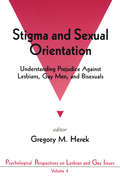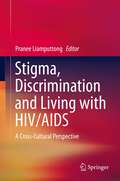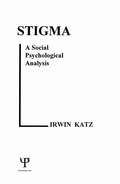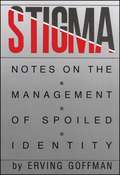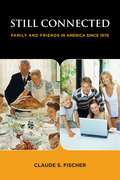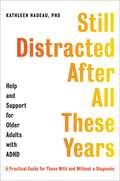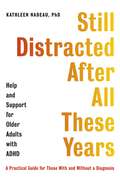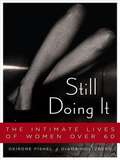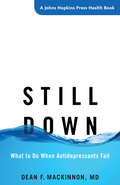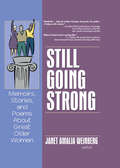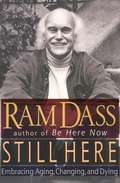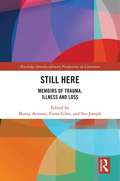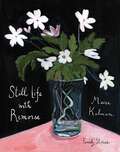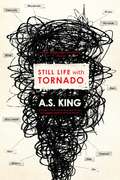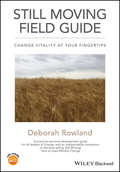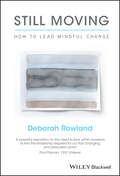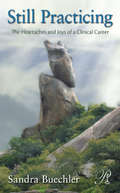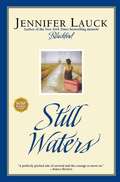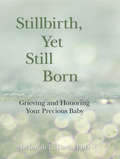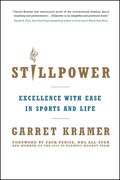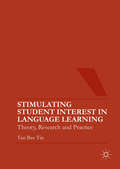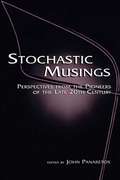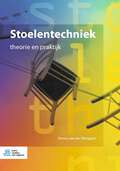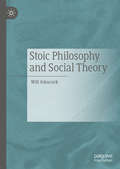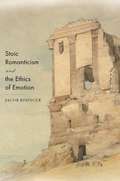- Table View
- List View
Stigma and Sexual Orientation: Understanding Prejudice against Lesbians, Gay Men and Bisexuals
by Professor Gregory M HerekThis timely and accessible contribution towards a deeper understanding of homophobia provides much-needed insight into the issue of prejudice in general. Topics discussed include: the nature of antigay prejudice, stereotypes and behaviors; the consequences of homophobia and related phenomena on the well-being of lesbians, gay men and bisexuals; and the critical need for psychology and science to examine homophobia and related issues.
Stigma, Discrimination and Living with HIV/AIDS
by Pranee LiamputtongUp until now, many articles have been written to portray stigma and discrimination which occur with people living with HIV/AIDS (PLWHA) in many parts of the world. But this is the first book which attempts to put together results from empirical research relating to stigma, discrimination and living with HIV/AIDS. The focus of this book is on issues relevant to stigma and discrimination which have occurred to individuals and groups in different parts of the globe, as well as how these individuals and groups attempt to deal with HIV/AIDS. The book comprises chapters written by researchers who carry out their projects in different parts of the world and each chapter contains empirical information based on real life situations. This can be used as an evidence for health care providers to implement socially and culturally appropriate services to assist individuals and groups who are living with HIV/AIDS in many societies. The book is of interest to health care providers who have their interests in working with individuals and groups who are living with HIV/AIDS from a cross-cultural perspective. It will be useful for students and lecturers in courses such as anthropology, sociology, social work, nursing, public health and medicine. In particular, it will assist health workers in community health centres and hospitals in understanding issues related to HIV/AIDS and hence provide culturally sensitive health care to people living with HIV/AIDS from different social and cultural backgrounds. The book is useful for anyone who is interested in HIV/AIDS-related stigma and discrimination in diverse social and cultural settings.
Stigma: A Social Psychological Analysis
by I. KatzFirst published in 1982. Routledge is an imprint of Taylor & Francis, an informa company.
Stigma: Notes on the Management of Spoiled Identity
by Erving GoffmanFrom the author of The Presentation of Self in Everyday Life, Stigma is analyzes a person’s feelings about himself and his relationship to people whom society calls “normal.”Stigma is an illuminating excursion into the situation of persons who are unable to conform to standards that society calls normal. Disqualified from full social acceptance, they are stigmatized individuals. Physically deformed people, ex-mental patients, drug addicts, prostitutes, or those ostracized for other reasons must constantly strive to adjust to their precarious social identities. Their image of themselves must daily confront and be affronted by the image which others reflect back to them.Drawing extensively on autobiographies and case studies, sociologist Erving Goffman analyzes the stigmatized person’s feelings about himself and his relationship to “normals” He explores the variety of strategies stigmatized individuals employ to deal with the rejection of others, and the complex sorts of information about themselves they project. In Stigma the interplay of alternatives the stigmatized individual must face every day is brilliantly examined by one of America’s leading social analysts.
Still Connected: Family and Friends in America since 1970
by Fischer Claude S.National news reports periodically proclaim that American life is lonelier than ever, and new books on the subject with titles like Bowling Alone generate considerable anxiety about the declining quality of Americans' social ties. Still Connected challenges such concerns by asking a simple yet significant question: have Americans' bonds with family and friends changed since the 1970s, and, if so, how? Noted sociologist Claude Fischer examines long-term trends in family ties and friendships and paints an insightful and ultimately reassuring portrait of Americans' personal relationships. Still Connected analyzes forty years of survey research to address whether and how Americans' personal ties have changed--their involvement with relatives, the number of friends they have and their contacts with those friends, the amount of practical and emotional support they are able to count on, and how emotionally tied they feel to these relationships. The book shows that Americans today have fewer relatives than they did forty years ago and that formal gatherings have declined over the decades--at least partially as a result of later marriages and more women in the work force. Yet neither the overall quantity of personal relationships nor, more importantly, the quality of those relationships has diminished. Americans' contact with relatives and friends, as well as their feelings of emotional connectedness, has changed relatively little since the 1970s. Although Americans are marrying later and single people feel lonely, few Americans report being socially isolated and the percentage who do has not really increased. Fischer maintains that this constancy testifies to the value Americans place on family and friends and to their willingness to adapt to changing circumstances in ways that sustain their social connections. For example, children now often have schedules as busy as their parents. Yet today's parents spend more quality time with their children than parents did forty years ago--although less in the form of organized home activities and more in the form of accompanying them to play dates or sports activities. And those family meals at home that seem to be disappearing? While survey research shows that families dine at home together less often, it also shows that they dine out together more often. Americans are fascinated by the quality of their relationships with family and friends and whether these bonds fray or remain stable over time. With so many voices heralding the demise of personal relationships, it's no wonder that confusion on this topic abounds. An engrossing and accessible social history, Still Connected brings a much-needed note of clarity to the discussion. Americans' personal ties, this book assures us, remain strong.
Still Distracted After All These Years: Help and Support for Older Adults with ADHD
by Kathleen G. NadeauOne of the foremost ADHD experts tackles adult cases in the aging generation and offers a practical, helpful guide for those with and without a diagnosis Do you… Forget to pay bills Live in a disorganized environment Struggle with depression and anxiety Procrastinate on projects, even ones that initially excite you Have high levels of conflict with those close to you Have a child diagnosed with ADHD and/or a family history of learning disorders If some of these patterns sound familiar, you may have undiagnosed ADHD. ADHD in adults is one of the most common disorders. Living with ADHD in our later years is hugely influenced by multiple factors: co-occurring issues, such as anxiety, depression, low self-esteem, and learning disorders combined with a heightened level of stress, the presence or lack of support from others, and the number of people we are responsible for, can complicate and intensify the effects of ADHD. The good news is that you&’ve come to the right place to learn more about how older adults with ADHD can lead calmer, happier, more productive lives. Dr. Kathleen Nadeau, a foremost authority on ADHD, has been working with this underserved and underrepresented population. Dedicated to the health and wellbeing of today&’s older adults with ADHD, Still Distracted After All These Years offers strategies to build a support system, gain better control over your daily life and create a more ADHD-friendly retirement.
Still Distracted After All These Years: Help and Support for Older Adults with ADHD
by Kathleen NadeauThe world's foremost expert shares advice on later-in-life ADHD, tackling everything from finances, parenting, planning for retirement, social life and work, in this practical and helpful guide for those with and without a diagnosis.Do you...· Forget to pay bills?· Live in a disorganised environment?· Struggle with mental health?· Procrastinate on projects, even ones that initially excite you?· Have high levels of conflict with those close to you?· Have a child diagnosed with ADHD and/or a family history of learning disorders?If some of these patterns sound familiar, you might understandably fear the onset of dementia, but you may have undiagnosed attention deficit hyperactivity disorder (ADHD). ADHD in adults is one of the most common disorders. Living with ADHD in our later years is hugely influenced by co-occurring issues, such as anxiety, depression or low self-esteem. In addition, the presence of learning disorders, heightened levels of stress, the presence or lack of support from others, and the number of people we are responsible for, can all complicate and intensify the effects of ADHD.The good news is that you've come to the right place to learn more about how to lead a calmer, happier, more productive life. Dedicated to the health and wellbeing of today's older adults with ADHD, Still Distracted After All These Years offers strategies to build a support system, gain better control over your daily life and create a more ADHD-friendly retirement.
Still Doing It
by Deirdre Fishel Diana Holtzberg"An informed, honest, joyous book. Younger women may well envy us." -Suzanne Braun Levine, author of Inventing the Rest of Our Lives and "Sex, love, and life can grow even richer as we grow older, and the stereotype-busting women in this book show us scores of ways. These women are not going downhill, they're on a roll. They are women of juice and wisdom-and living proof that the best is yet to come."- Gina Ogden, PhD, author of Women Who Love Sex, The Heart and Soul of Sex, and The Return of Desire When Deirdre Fishel and Diana Holtzberg began work on their documentary Still Doing It, they knew they were catching a wave. The women of the baby-boom generation who had been so outspoken about sexuality and freedom were about to turn sixty, yet no one was talking about the revolution in aging. Nor was anyone letting on about the big dark secret that women born before the boomers, even way before, were a hell of a lot more vital than the images we were getting, and many were still having sex-and loving it! In Still Doing It, Fishel, Holtzberg, and the incredible women in their documentary broke the silence. Now they are back, with a stimulating and eye-opening book that offers a deeper look at women who break every stereotype we have about sex and intimacy. These women are dynamic, confident, opinionated, and wise. They're also having the kind of intense sexual experiences and fantasies we never associate with grandmothers. You'll meet Betty, who met her live-in boyfriend in an online chat room when she was sixty-nine and he was twenty-two; Joani, age seventy, who shares her boyfriend with another woman; and Frances, who encountered the intellectual and sexual love of her life at eighty. Today's women are living longer, healthier lives, and their appetite for sex and adventure isn't fading. Aware of their mortality, they understand just how precious life really is, and are willing to take risks to go after what they want. Challenging stereotypes about older women, Still Doing It lets everyone know that sex and adventure do not need to end when you hit sixty (or seventy . . . or ninety!). In fact, the good stuff is often just beginning.
Still Down: What to Do When Antidepressants Fail (A Johns Hopkins Press Health Book)
by Dean F. MacKinnonExpert insight and advice to help people with treatment-resistant depression feel better.Major depressive disorder is a common medical condition that can be disabling and can persist for months, even years. Many people experience depression symptoms that resist treatment. Although they try various combinations of medications, psychotherapy, or electroconvulsive therapy, their symptoms don’t improve. What can people who have treatment-resistant depression do to overcome their depression and feel better? In Still Down, Dr. Dean F. MacKinnon, a psychiatrist at Johns Hopkins Medical School, presents nine composite stories drawn from patients he has seen in his twenty years as an expert in treatment-resistant mood disorders. The first section of the book features people diagnosed with depression who have not yet received appropriate treatment. The next section looks at misdiagnosis, focusing on people who feel and appear depressed but who have different mood disorders and need treatment for them. Finally, Dr. MacKinnon describes people who have severe depression that does not respond to any treatment, regardless of how finely tuned the treatment might be. These people, who suffer from true treatment-resistant depression (TRD), can benefit from a variety of treatments to feel better. Dr. MacKinnon provides commentary to explain and extend the discussion of the patients and situations in each case. He also discusses common obstacles to improvement, including overly conservative dosing, problems stemming from not adhering to treatment, antidepressant failure, and high sensitivity to side effects. By identifying aspects of the individual’s qualities, behaviors, and experiences that may account for poor response to treatment, Still Down points the way for people with TRD and their families to find appropriate diagnoses and the best possible care.
Still Going Strong: Memoirs, Stories, and Poems About Great Older Women
by Janet Amalia WeinbergIt's terrible to get old? Life is all downhill after fifty? That's what our youth-centered culture may think but don't be duped. Selected as a finalist for 2006 Independent Publisher Book Awards, this book can change how you think about aging, even make you feel good about getting old! “. . . a liberating change is happening, a change as momentous as the liberation movements of the 1960s and 70s. It brings respect for older people, appreciation for maturity, and the promise of a more balanced culture.”—from the Introduction by Margaret Karmazin and Janet Amalia Weinberg. Discover a new, positive way of looking at aging with Still Going Strong: Memoirs, Stories, and Poems About Great Older Women. This exuberant, inspiring anthology celebrates the vitality of older women and shows them having adventures, facing loss, enjoying romance, and feeling more capable and confident than ever. The 42 authors included in the collection know that life after middle age is not the diminished state dreaded by our youth-centered culture, but rather, a time of growth and fulfillment, enriched by the wisdom of experience and perspective. Get a taste of the passion, wit, and wisdom of some of these women: From “Why Vermont” by Elayne Clift:“It was great not to be driven by achievement. I was learning the art of laid-back living. Spending a day writing, or reading, was heavenly and I was reminded of my freedom whenever a friend said, ‘I'd give anything to be doing that!’” From “Gray Matters” by Marsha Dubrow:“. . . finally [I] have decided to enjoy being a gray. It links me with a powerful sisterhood, complimenting each other on our gray badge of courage. A woman with dreadlocks resembling pillars of salt approached me on the street and said, ‘You go, girlfriend. We're gray and we're proud—and gorgeous.’ We smacked high fives.” From “Katherine Banning: Wife, Mother, Bank Robber” by Melissa Lugo:“Crazy, you say? Well, wait till you hit 90 and realize you still want to live, that even though you're way past menopause you want another child, and that even though your breasts make tracks in the mud, you still want a lover, and that even though your hands shake, there are still things that you didn't get to do (like going to the Olympics and bringing home the gold) things you want to do, that you will do. Then, see what you're capable of. And you'll be perfectly sane. Senility, temporary insanity, it's all bull. Old folks know exactly what they're doing. One of the good parts about being an old fart is that you have a license to be loony tunes, to live the wild way you didn't have the balls for before. At 90, you see, your dignity's gone the way of dirty diapers, and your life is heading the same way fast. You have nothing to lose except the moment.” From “A Different Woman” by Joan Kip:“My relationship with Seth is, I tell him, my great experiment. He calls me on every one of my tightly-held protections, and his pleasure in meeting my body is matched by my own freedom to respond. Ours is a relationship with no hidden agenda, no commitments. Our occasional evenings of uncomplicated delight are the intertwining of two desires who touch down and embrace one another, knowing they will meet again, sometime, somewhere. And while sex is not absent from our meetings, it is, rather, my compelling ache to be touched and held and to touch and hold that pulls me back each time to Seth. Like the newly-born whose being depends upon the enfolding presence of a parent, those of us who are now so old, glow more warmly when we, too, may share our tenderness.” Still Going Strong counters demeaning stereotypes of “little old ladies” by offering positive, empowering views of women over fifty. It is a hopeful voice that speaks to any woman facing her own future.
Still Here: Embracing Aging, Changing, and Dying
by Ram DassMore than thirty years ago, an entire generation sought a new way of life and looked for fulfillment and meaning in a way that no one had thought to look for these things before. This was the Woodstock generation and they were led on their quest by the man who was there before all of us: Ram Dass. He left his teaching post at Harvard to embody the role of spiritual seeker, he showed us all in one of the greatest spiritual classics of this century how to begin to find peace within ourselves in his 2 million-copy bestseller, Be Here Now. Ram Dass went on to lecture around the world, to build foundations, and to dedicate himself to the service of others. A few of his readers followed him, but most went into business, had children, built houses, and set the larger questions of meaning and fulfillment aside. Now, we find we need Ram Dass again. As we enter the later stages of life, the big questions of peace and of purpose have reappeared, this time demanding answers. Our old friend Ram Dass has returned, inviting us to join him on the next stage of the journey. With him we explore the joy, pain, and opportunities of the ripening seasons of our lives. Writing with his trademark humor and wisdom, sharing stories from his own life and meditation exercises to integrate the teachings, Ram Dass once again provides a new perspective on the territory that lies ahead. "Ram Dass is a superb writer. His example of gentleness and loving compassion is infused with profound wisdom of the heart and mind, a welcome sense of humor, and a savvy effectiveness in the real world." -San Francisco Chronicle
Still Here: Memoirs of Trauma, Illness and Loss (Routledge Interdisciplinary Perspectives on Literature)
by Fiona Giles Bunty Avieson Sue JosephStill Here: Memoirs of Trauma, Illness and Loss explores the history, ethics, and cross-cultural range of memoirs focusing on illness, death, loss, displacement, and other experiences of trauma. From Walt Whitman’s Civil War diaries to kitchen table survivor-to-survivor storytelling following Hurricane Katrina, from social media posts from a refugee detention centre, to poetry by exiles fleeing war zones, the collection investigates trauma memoir writing as healing, as documentation of suffering and disability, and as political activism. Editors Bunty Avieson, Fiona Giles and Sue Joseph have brought together this scholarly collection as a sequel to their earlier Mediating Memory (Routledge 2018), providing a closer look at the specific concerns of trauma memoir, including conflict and intergenerational trauma; the therapeutic potential and risks of trauma life writing; its ethical challenges; and trauma memoir giving voice to minority experiences.
Still Life with Remorse
by Maira KalmanFrom the critically acclaimed artist, designer, and author of the bestsellers The Principles of Uncertainty, My Favorite Things, and Women Holding Things comes a moving meditation in words and pictures on remorse, joy, ancestry, and memory. Maira Kalman’s most autobiographical and intimate work to date, Still Life with Remorse is a beautiful, four-color collection combining deeply personal stories and 50 striking full-color paintings in the vein of her and Alex Kalman’s acclaimed Women Holding Things.Tracing her family’s story from her grandfather’s birth in Belarus and emigration to Tel Aviv—where she was born—Maira considers her unique family history, illuminating the complex relationship between recollection, regret, happiness, and heritage. The vibrant original art accompanying these autobiographical pieces are mostly still lifes and interiors which serve as counterpoints to her powerful words. In addition to vignettes exploring her Israeli and Jewish roots, Kalman includes short stories about other great artists, writers, and composers, including Leo Tolstoy, Franz Kafka, Gustav Mahler, and Robert Schumann.Through these narratives, Kalman uses her signature wit and tenderness to reveal how family history plays an influential role in all of our work, lives, and perspectives. A feat of visual storytelling and vulnerability, Still Life with Remorse explores the profound hidden in the quotidian, and illuminates the powerful universal truths in our most personal family stories.
Still Life with Tornado
by A. S. King<P>A heartbreaking and mindbending story of a talented teenage artist's awakening to the brokenness of her family from critically acclaimed award-winner A.S. King. <P>Sixteen-year-old Sarah can't draw. This is a problem, because as long as she can remember, she has "done the art." She thinks she's having an existential crisis. And she might be right; she does keep running into past and future versions of herself as she wanders the urban ruins of Philadelphia. Or maybe she's finally waking up to the tornado that is her family, the tornado that six years ago sent her once-beloved older brother flying across the country for a reason she can't quite recall. <P>After decades of staying together "for the kids" and building a family on a foundation of lies and domestic violence, Sarah's parents have reached the end. Now Sarah must come to grips with years spent sleepwalking in the ruins of their toxic marriage. As Sarah herself often observes, nothing about her pain is remotely original--and yet it still hurts. <p>Insightful, heartbreaking, and ultimately hopeful, this is a vivid portrait of abuse, survival, resurgence that will linger with readers long after the last page. </p>
Still Moving Field Guide: Change Vitality At Your Fingertips
by Deborah RowlandThe companion to the bestselling book on leading change, Still Moving Still Moving Field Guide is a companion to the bestselling Still Moving: How to Lead Mindful Change. Designed as a practical resource, the Field Guide takes the reader on a journey to hone their leadership skills in order to lead change with confidence. Step by step, readers will progress through the Still Moving concepts. New to the guide is the innovative Change Vitality model (an energizing holistic way of leading change) that puts all the Still Moving concepts into one effective picture. The author breaks down each element of the Change Vitality model and explores what the element is, how to recognize it, and why it helps leaders lead change well. The model also shows how to rate your own leadership in a particular skill, and includes tales from the field on putting the skill into action. The guide also contains further reading and resources to help cultivate the skills presented. This important book: Offers a practical guide for developing the change leadership skills outlined in Still Moving Contains application stories with real life leaders in change Presents the Change Vitality model - a new, holistic and research-based framework for how to lead change with greater ease Provides an interactive immersion journey into the Still Moving content Includes spaces for journaling and self-reflection Written for all curious change leaders, change coaches, change consultants, and HR professionals, the Still Moving Field Guide is filled with practical ideas on how to use the Still Moving concepts with yourself, your team, and the wider systems you are seeking to transform.
Still Moving: How to Lead Mindful Change
by Deborah RowlandStill Moving: How to Lead Mindful Change sets out an innovative approach for guiding organisations and indeed entire systems through ongoing, disruptive change. It combines Deborah Rowland's own rigorous research into change and its leadership with insights from her extensive field experience helping major global corporations including GlaxoSmithKline, RWE and Shell achieve lasting change with increased productivity, employee engagement and responsible societal impact. It is filled with helpful inspiring stories of leadership and change from the real world and, bravely, the author's own personal journey. Challenging leaders to cultivate both their inner and outer skills necessary for success, Still Moving weaves together the "being" and "doing" of states of leading change and emphasises the importance of a mindful stance and deep systemic perception within a leader. With the goal of collaborative, sustainable change, the book delves into a variety of important topics, including present-moment awareness, intentional response, edge and tension and emergent change. Compelling and provocative, Still Moving questions the conventional wisdom of much change theory and asks that leaders first work on their inner source in order to more effortlessly change the world around them.
Still Practicing: The Heartaches and Joys of a Clinical Career (Psychoanalysis in a New Key Book Series #15)
by Sandra Buechler"Still practicing" has several meanings. Still practicing suggests that the balance of heartaches and joys must not deter us from pursuing a clinical practice. At the same time, still practicing suggests that for the clinician "practice" never "makes perfect." We continue to refine our clinical instruments over our entire working lives. Framed by her previous work on the concept of emotional balance, Sandra Buechler investigates how vicissitudes in a clinical career can have a profound and lasting impact on the clinician's emotional balance, and considers how the clinician's resilience is maintained in the face of the personal fallout of a lifetime of clinical practice. At each juncture, from training to early phases of clinical experience, through mid and late career, she asks, what can help us maintain a vital interest in our work? How do we not burn out? Aimed at the nexus of the personal and theoretical, Still Practicing concentrates on the sadness, feelings of shame, and satisfactions inherent in practice, and encourages newcomers and veterans alike to make career choices mindful of their potential long-term impact on their feelings about being therapists. It poses a question vital to the life of the clinician: How can we strike a balance between the work's inevitable pain and its potential joy?
Still Waters
by Jennifer LauckAnger is a poison ivy in the heart and if it grows unchecked, it covers all the soft spaces where you love and understand and feel joy. There's power in anger, sure, a power that can help you survive. But true wisdom is in knowing when to let it go. In Still Waters, Jennifer Lauck continues the riveting true story begun in her critically acclaimed memoir, Blackbird. Clutching her pink trunk filled with secret treasures, the last relics of a lost childhood, twelve-year-old Jenny steps off a bus in Reno and straight into the wide-open future, where no path is certain except that of her own heart....Separated from her brother, Bryan, and passed from caretaker to caretaker, Jenny endures as she always has: by following the inner compass of the survivor. But when Bryan chooses a shocking, tragic destiny, Jenny must at last confront the secrets, lies, and loneliness that have held her prisoner for years. Embarking on a search for answers, the adult Jenny discovers that the past cannot be locked away forever -- even when unraveling one's own anger and pain seems an impossible feat. Now, in the warmth and understanding of her marriage, in the eyes of her child, and in powerful conversations with a dynamic young priest, Jennifer finds her own miracles. A hardened heart learns to love. A damaged soul finds peace. And life, once merely a matter of survival, becomes rich with the joys of truly living.
Stillbirth, Yet Still Born: Grieving and Honoring Your Precious Baby
by Ph.D. Deborah L. DavisThis small book offers tailored information and support to accompany parents through the early hours, days, and weeks that follow the death and birth of their beloved baby.<P><P> It also offers strategies for enduring labor and delivery, and compassionate suggestions for spending time with the little one. Parents will find ideas for affirming and honoring their precious baby's life.
Stillpower: Excellence with Ease in Sports and Life
by Garret KramerFuel Your Performance, and Life, with the Clarity of Stillpower For years, athletes, coaches, parents, and organizations have searched for the secrets to optimum mental performance. However, in spite of a myriad of tools and techniques, success and contentment continue to be as elusive as ever, until now. Garret Kramer's Stillpower offers a revolutionary explanation for this predicament and provides a basic, yet dynamic, approach for the future. In an accessible style, Kramer reveals the innate principles behind consistent achievement and highlights the misalignment between the experiences of all performers and the strategies of the coaches, psychologists, and experts who are hoping to help them. Stillpower uses real-life examples to explore such questions as: What is "the zone" and what must we do (or not do) to get there? Why do we need to understand the difference between insight and intellect? Is goal setting really useful? Why doesn't willpower work? And why do the best mentors focus on a person's state of mind and not behavior? Virtually all of us--athletes and non-athletes alike--are looking outside of ourselves, trying to unlock the keys to happiness, freedom, and excellence with ease. Stillpower encourages us to look within to finally find the answers.
Stimulating Student Interest in Language Learning
by Tan Bee TinThis book explores the issues and concerns many language teachers have in not just helping able students to learn a foreign or second language but more importantly how to get reluctant learners to become interested in language learning. Tin proposes 'interest' as an important construct that requires investigation if we are to understand second language learning experiences in a modern globalised world. The book offers both theoretical explorations and empirical findings arising from the author's own research in the field. Chapters demonstrate how various theoretical and empirical findings can be applied to practice so as to raise the awareness of the importance of interest in language learning and teaching. For teacher trainers and educators, researchers, and practising language teachers, this comprehensive study provides tools to stimulate student interest in language learning for successful language learning.
Stochastic Musings: Perspectives From the Pioneers of the Late 20th Century
by John PanaretosThis new edited volume features contributions from many of the leading scientists in probability and statistics from the latter part of the 20th century. It is the only book to assemble the views of these leading scientists--the pioneers in their respective fields. Stochastic Musings features contributions by: *Sir David Cox on statistics and econometrics; *C.R. Rao, M.B. Rao, and D.N. Shanbhag on convex sets of multivariate distributions and their extreme points; *Bradley Efron on the future of statistics; *David Freedman on regression association and causation; *Vic Barnett on sample ordering for effective statistical inference with particular reference to environmental issues; *David Bartholomew on a unified statistical approach to some measurement problems in the social sciences; *Joe Gani on scanning a lattice for a particular pattern; *Leslie Kish on new paradigms for probability sampling (his last paper); *Samuel Kotz and Norman L. Johnson on limit distributions of uncorrelated but dependent distributions on the unit square; *Samuel Kotz and Saralees Nadarajah on some new elliptical distributions; *Jef Teugels on the life span of a renewal; *Wolfgang Urfer and Katharina Emrich on maximum likelihood estimates of genetic effects; and **Vladimir M. Zolotarev on convergence rate estimates in functional limit theorems. The volume also includes the following contributions by faculty members of the Department of Statistics, Athens University of Economics and Business: *J. Panaretos, E. Xekalaki, and S. Psarakis on a predictive model evaluation and selection approach--the correlated gamma ratio distribution; *J. Panaretos and Z. Tsourti on extreme value index estimators and smoothing alternatives; *E. Xekalaki and D. Karlis on mixtures everywhere; and * Ir. Moustaki on latent variable models with covariates. Stochastic Musings will appeal to researchers, professionals, and students interested in the history and development of statistics and probability as well as in related areas, such as physics, biometry, economics, and mathematics. Academic and professional statisticians will benefit from the book's coverage of the latest developments in the field, as well as reflections on the future directions of the discipline.
Stoelentechniek: theorie en praktijk
by Remco van der WijngaartDit boek helpt therapeuten om de stoelentechniek toe te passen in hun praktijk. Met die techniek kunnen ze cliënten helpen afstand te nemen van oude overtuigingen en verstandelijk inzichten om te zetten in correctieve emotionele ervaringen. Voor therapeuten die al ervaring hebben met de techniek biedt het boek handvatten om effectiever de uitdagende situaties te kunnen hanteren bij het toepassen van de stoelenoefening. Het boek beschrijft de toepassing van de stoelentechniek in de verschillende fasen van de behandeling. Achtereenvolgens behandelt het boek de stoelentechniek in de analysefase, de beginfase, de middenfase en de eindfase. Het boek biedt telkens tal van variaties in het gebruik van de techniek, met veel praktijkvoorbeelden. Elk van deze hoofdstukken eindigt met het beantwoorden van diverse ‘Wat nou als…?’-vragen waar therapeuten in de klinische praktijk mee te maken krijgen. Vervolgens behandelt het boek specialistische toepassingsgebieden zoals rouw en relatieproblemen, en beschrijft het de mogelijkheden om stoelentechniek online in te zetten. Het laatste hoofdstuk richt zich op valkuilen voor de therapeut. Stoelentechniek theorie en praktijk is geschreven door Remco van der Wijngaart, psychotherapeut en gezondheidszorgpsycholoog. Hij is meer dan twintig jaar werkzaam geweest op een academische afdeling van een ambulante instelling voor geestelijke gezondheidszorg. Daar participeerde hij als therapeut aan diverse behandelstudies bij angst-, somatoforme- en eetstoornissen en persoonlijkheidsstoornissen. In een eerste behandelstudie naar de effectiviteit van schematherapie voor borderlinepersoonlijkheidsstoornis is hij getraind en gesuperviseerd in de stoelentechniek door Jeffrey Young, grondlegger van schematherapie. Momenteel is Remco werkzaam in een zelfstandige praktijk voor psychotherapie in Maastricht. Hij heeft, in samenwerking met anderen, diverse audiovisuele producties ontwikkeld, zoals Fine Tuning Chairwork waarin 34 scènes alle facetten tonen van de stoelentechniek.
Stoic Philosophy and Social Theory
by Will JohncockThis book puts recently re-popularized ancient Stoic philosophy in discussion with modern social theory and sociology to consider the relationship between an individual and their environment. Thirteen comparative pairings including Epictetus and Émile Durkheim, Zeno and Pierre Bourdieu, and Marcus Aurelius and George Herbert Mead explore how to position individualism within our socialized existence. Will Johncock believes that by integrating modern perspectives with ancient Stoic philosophies we can question how internally separate from our social environment we ever are. This tandem analysis identifies new orientations for established ideas in Stoicism and social theory about the mind, being present, self-preservation, knowledge, travel, climate change, the body, kinship, gender, education, and emotions.
Stoic Romanticism and the Ethics of Emotion
by Jacob RisingerAn exploration of Stoicism’s central role in British and American writing of the Romantic periodStoic philosophers and Romantic writers might seem to have nothing in common: the ancient Stoics championed the elimination of emotion, and Romantic writers made a bold new case for expression, adopting “powerful feeling” as the bedrock of poetry. Stoic Romanticism and the Ethics of Emotion refutes this notion by demonstrating that Romantic-era writers devoted a surprising amount of attention to Stoicism and its dispassionate mandate. Jacob Risinger explores the subterranean but vital life of Stoic philosophy in British and American Romanticism, from William Wordsworth to Ralph Waldo Emerson. He shows that the Romantic era—the period most polemically invested in emotion as art’s mainspring—was also captivated by the Stoic idea that aesthetic and ethical judgment demanded the transcendence of emotion.Risinger argues that Stoicism was a central preoccupation in a world destabilized by the French Revolution. Creating a space for the skeptical evaluation of feeling and affect, Stoicism became the subject of poetic reflection, ethical inquiry, and political debate. Risinger examines Wordsworth’s affinity with William Godwin’s evolving philosophy, Samuel Taylor Coleridge’s attempt to embed Stoic reflection within the lyric itself, Lord Byron’s depiction of Stoicism at the level of character, visions of a Stoic future in novels by Mary Shelley and Sarah Scott, and the Stoic foundations of Emerson’s arguments for self-reliance and social reform.Stoic Romanticism and the Ethics of Emotion illustrates how the austerity of ancient philosophy was not inimical to Romantic creativity, but vital to its realization.
